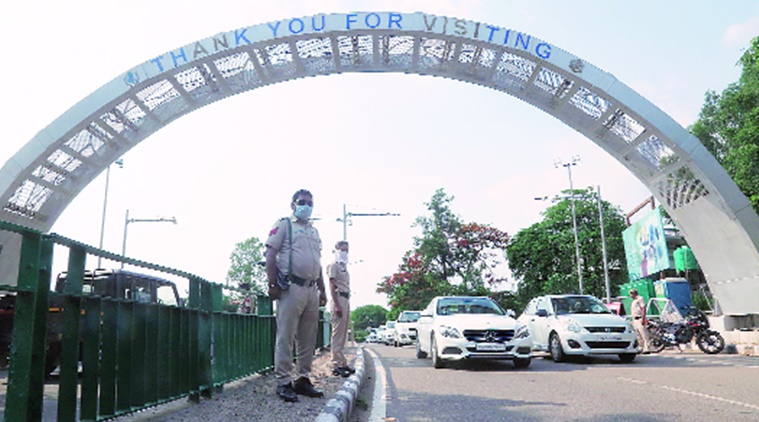 The nodal officers are keeping in touch with RWAs, sarpanchs, industrial units, poultry farm
The nodal officers are keeping in touch with RWAs, sarpanchs, industrial units, poultry farmowners, private organisations, screening plants and
crushers to track the inflow of people. Express photo: Jaipal Singh
Higher inflow of people with lower sampling capacity mars Panchkula, as it races against time to stop community spread in the city.
While the district authorities have been vigilant and have conducted aggressive random community sampling as well as contact tracing, the recent onset of inter-state travel has complicated matters for the health department.
In an attempt not to let community spread start in the district, they have started operating their newly constructed lab for 24 hours a day.
The lab, unlike any other, now can test and process 400 samples a day. A whole dispensary of Sector 7 too has been converted into a sampling centre for the travellers.
The health department has fixed 100 tests per day only for the people who have travelled to the city, but they fear this many not be enough.
While a comprehensive list of all people coming via air and trains is being kept and it is being ensured that all are tested, it just isn’t possible to trace all cases coming in private vehicles as well as buses, say officials.
“We have set a limit of 100 cases per day only to be dedicated to those who have travelled. This too has only been done as many of them, especially those coming from Delhi, Gurugram, Bangalore and Mumbai, are testing positive. We have extended our capacity by a lot but it will definitely not be possible to give anymore of our time and resources to travel cases,” says the CMO, Dr Jasjeet Kaur.
Meanwhile, the hospital has been working on a strategy which has been given the go-ahead by the Deputy Commissioner for all people reaching the district via buses, wherein the Haryana Roadways has been asked to ensure that all passengers download an application where they will have to fill data as to how they can be tracked and symptoms, in case they develop any.
“The application is a simple one and requires people only to put in their personal data and any symptoms they have. This way, we can closely monitor and easily trace anybody who may have been affected,” says Deputy Civil Surgeon, Dr Saroj Aggarwal.
The health administration is advising all those travelling to download the application, which will help the department keep a track of the vulnerable people.
“With inter-city travel, cases are bound to increase. But we want people to self-assess and self-report. It is impossible to trace each one of them, they will have to take some responsibility for their own selves
and for society,” Dr Aggarwal says.
The strategy for those travelling by road has been made in such a way that each time a cluster comes in, only those most vulnerable will be tested. If any of them comes out positive, then that whole cluster will be tested.
“This way, we will make sure no one is positive and also save our resources,” Dr Aggarwal adds.
Random sampling and testing is also being conducted in all containment areas as well as vulnerable areas, including slums of the city.
The district administration too has passed several orders demarcating various zones and employing a nodal officer at each one of them to check for any persons reaching Panchkula.
While six nodal officers had been appointed on June 1, another six were appointed June 7. Officers are keeping in touch with RWAs, sarpanchs, industrial units, poultry farm owners, private organisations, screening plants and
crushers.
ITBP has recently brought back some 50 of its employees and some policemen too have joined back the force, all of them will be tested, the Panchkula CMO said.